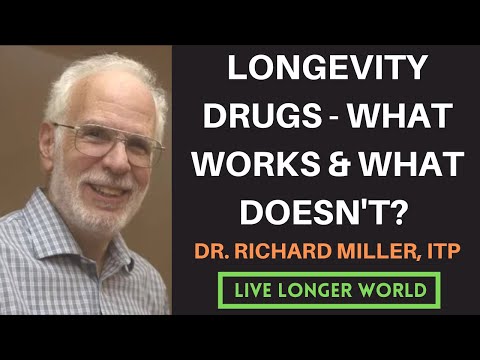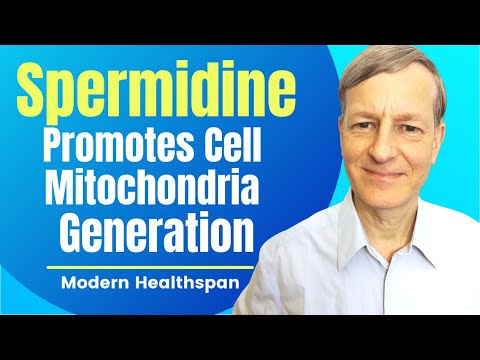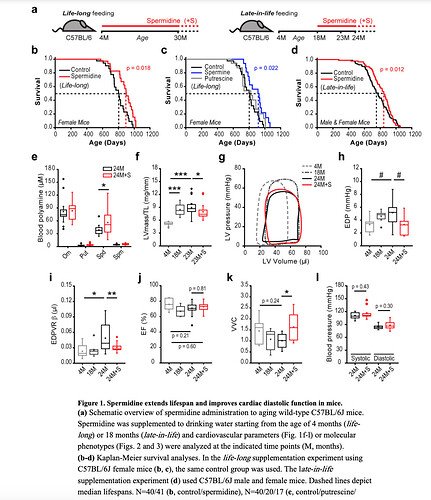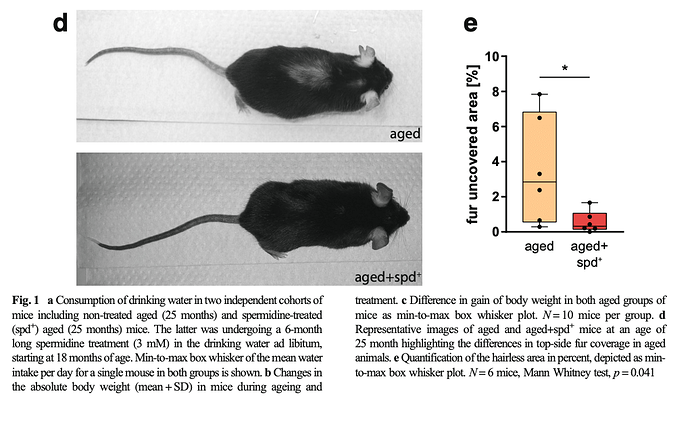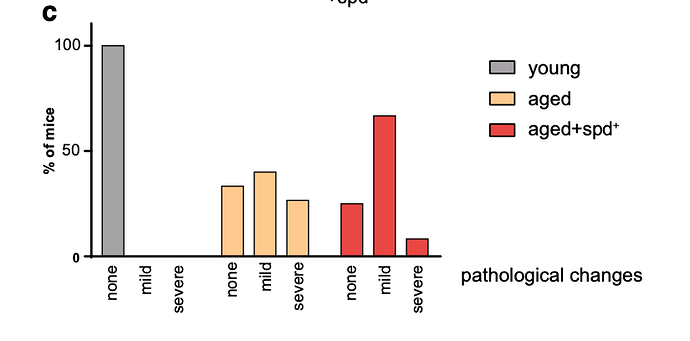Summary: External supply of the natural polyamine spermidine can extend life span in model organisms including yeast, nematodes, flies and mice. Recent epidemiological evidence suggests that increased uptake of spermidine with food also reduces overall, cardiovascular and cancer-related mortality in humans. Here, we discuss the possible mechanisms of this intriguing spermidine effect.
Spermidine didn’t even get tested by the ITP because it wasn’t absorbed by the mice!
FWIW a mouse study;
Cardioprotection and lifespan extension by the natural polyamine spermidine
Tobias Eisenberg et al. Nat Med. 2016 Dec.
Looking for the black cat in the darken room.
Yes - Richard Miller said after several months of testing spermidine with mice, they could never detect any in the blood stream. If they couldn’t detect it in the blood stream, they didn’t feel that it was likely it would increase lifespan, so they did not pursue it further.
From the above paper titled;
“Cardioprotection and lifespan extension by the natural polyamine spermidine”
“In Dahl salt-sensitive rats that were fed a high-salt diet, a model for hypertension-induced congestive heart failure, spermidine feeding reduced systemic blood pressure, increased titin phosphorylation and prevented cardiac hypertrophy and a decline in diastolic function, thus delaying the progression to heart failure.”
One researcher locates a black cat{he thinks it is a black cat?], the other research can not locate the black cat. The rooms are dark.
Two researcher’s looking for black cat’s in dark rooms. One states he found a back cat. The other says he can not located the black cat.
Who is correct?
If you want the black cat, you have to go look yourself.
Miller could not be interested or looked in an incorrect location.
Review the Associated Material to the study/paper;
“Cardioprotection and lifespan extension by the natural polyamine spermidine”
see;
I am still looking for the black cat.
What’s the obsession with cats today?!
I’ll take Richard Miller’s view over almost anyone. The ITP is the ‘gold standard’ in longevity research with multi site rigorous testing and importantly, no conflicts of interest.
Ever person has an opinion, some opinions may be correct, other opinions may not be correct.
In “science” opinions change all the time.
I am still looking for the black cat in the dark room.{watch the video linked above; Stewart Firestein
Have you been smoking something?
I think you need to read some Daniel kahneman…
Can spermidine and diabetes be something to worry about?
We have often been told that if it sounds too good to be true…
My life experience has been that skeptics like Richard A. Miller, MD, PhD, Professor of Pathology, Institute of Gerontology Department of Pathology, Michigan Medicine, University of Michigan are the ones to listen to if we actually want the facts. He also has a keen sense of humor.
Spermidine Supplementation Protects the Liver Endothelium from Liver Damage in Mice
A quick review of this study;
Full Article:
0.9 mg/day in the study.
I believe my dietary intake is approx 20-25 mg/day., mostly from Natto, and aged cheddar, amazing nutrient dense whole foods on their own.
Still… listen to this specific portion of the video where Richard Miller talks about their efforts to test Spermidine (with instructions from the top researchers on Spermidine - Frank Madeo and his team at the University of Graz… After 6 months of testing they could still not find any evidence that it was increasing levels in blood or tissues in any of the organs tested… not a good sign:
I have not seen the published ITP/mice/Spermidine study, so impossible to comment rigorously.
Not going to fill pages, but here’s some bonafide papers:
Autophagy in T cells from aged donors is maintained by spermidine and correlates
with function and vaccine responses
"We have recently shown that treating old but not young mice with the metabolite spermidine
improves autophagy levels in B lymphocytes due to an age-related decline of endogenous spermidine. We find that spermidine levels decline in PBMCs in the older humans. We determined spermidine levels in PBMCs by gas chromatography-mass spectrometry (GC-MS), and found an inverse correlation between age and spermidine but not with spermine or putrescine (Figure 3a). This confirms earlier study in plasma in which spermidine levels were found to be low in the >65 age group and rising again in centenarians. With this study we show for the first time that the autophagy-inducing drug spermidine has an immune boosting effect on the T cell compartment in humans in vitro and that low autophagy levels correlate with low responses to vaccination. Therefore, spermidine and an mTOR inhibitor may have to be combined to optimally restore immune responses in the older adults.
Spermidine and Spermine Are Enriched in Whole Blood of Nona/Centenarians
https://doi.org/10.1089/rej.2012.1349
Recently, it has been demonstrated that exogenously administered spermidine promotes longevity in yeasts, flies, worms, and human cultured immune cells.
“Here, using a cross-sectional observational study, we determined whole-blood polyamines levels from 78 sex-matched unrelated individuals divided into three age groups: Group 1 (31–56 years, n = 26, mean age 44.6– 6.07), group 2 (60–80 years, n = 26, mean age 68.7– 6.07), and group 3 (90–106 years, n = 26, mean age 96.5– 4.59). The total content of polyamines is significantly lower in groups 2 and 3 compared to group 1 ( p = 3.6 · 10 - 12).”
Cardioprotection and lifespan extension by the natural polyamine spermidine
“Here we show that oral supplementation of the natural polyamine spermidine extends the lifespan of mice and exerts cardioprotective effects, reducing cardiac hypertrophy and preserving diastolic function in old mice. Spermidine feeding enhanced cardiac autophagy, mitophagy and mitochondrial respiration, and it also improved the mechano-elastical properties of cardiomyocytes in vivo, coinciding with increased titin phosphorylation and suppressed subclinical inflammation”
Novel aspects of age-protection by spermidine supplementation are associated with preserved telomere length
“Here, we show that a 6-month administration of the natural autophagy inducer spermidine in thedrinking water to aged mice is sufficient to significantly attenuate distinct age-associated phenotypes. These include modulation of brain glucose metabolism, suppression of distinct cardiac inflammation parameters decreased number of pathological sights in kidney and
liver and decrease of age-induced hair loss. Interestingly, spermidine-mediated age protection was associated with decreased telomere attrition, arguing in favour of a novel cellular mechanism behind the anti-ageing effects of spermidine administration”
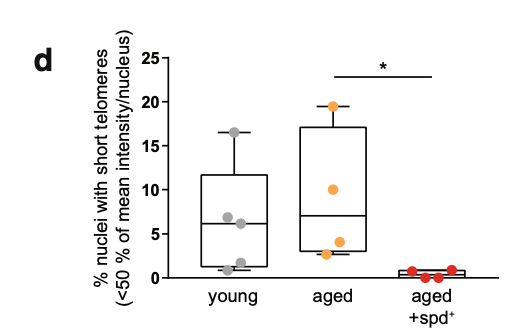
Spermidine protects from age-related synaptic alterations at hippocampal mossy fiber-CA3 synapses
“Our data demonstrate that dietary spermidine attenuates ageassociated deterioration of MF-CA3 synaptic transmission and plasticity. These fndings provide a physiological and molecular basis for the future therapeutic usage of spermidine.”
